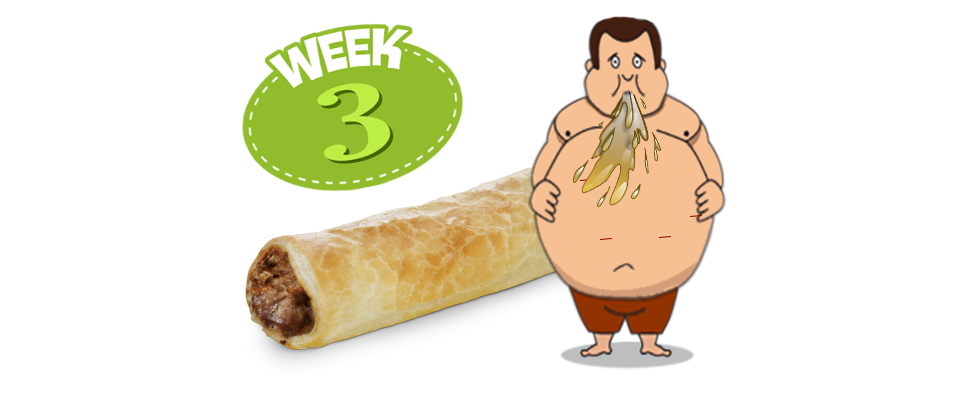
by Me | Oct 12, 2018 | Food & Diet, Post-Surgery
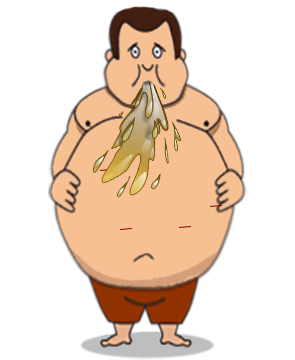
3 weeks know since my surgery and I am still feeling GREAT !!!
I have now lost 9Kg since surgery and am still feeling great… and continue to lose weight – but today… for the first time (probably of many) I Threw Up !!!
I was warned to expect this.. getting used to quantities and types of food I can eat is a normal part of the process… but it still came as a little bit of a surprise… I admit I am pushing the envelope a little on my diet, and today I thought I could manage a sausage roll – as long as I chewed it up well.
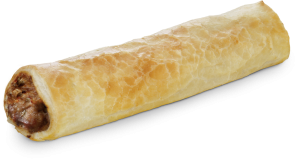 I did manage three quarters of it before I started to feel full and a little uncomfortable (which is not unusual), so I stopped. However, this time, after about 5 minutes I suddenly (without any warning) felt the need to throw up.
I did manage three quarters of it before I started to feel full and a little uncomfortable (which is not unusual), so I stopped. However, this time, after about 5 minutes I suddenly (without any warning) felt the need to throw up.
It wasn’t much … just a couple of mouthfulls… but interestingly (to me anyway), it wasn’t the sausage roll that I threw up, it was a clear slimy “liquid”…. no sausage roll (chewed or otherwise) in sight.
OK… I know I should still really be on “mush” (I have another week officially) but in the last few days I have been eating a few “other” things (some chips, some BBQ shapes), but consciously chewing them very well before swallowing.
I know once I start “eating real food”, that throwing up is a normal part of the process in coming to terms with the types and quantities of food that I can eat… and I have been told that the “types” of food can be a more significant factor that the quantity. In this case, I didn’t eat very much, but I am guessing my new stomach is not used to high carb/fatty foods.
I promise to eat better (at least until my next appointment next week with the dietician/surgeon) 🙂
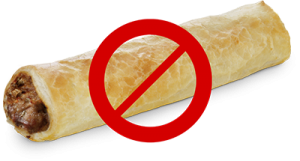 p.s. although I was tempted… I didn’t go back later and finish off he sausage roll 🙂
p.s. although I was tempted… I didn’t go back later and finish off he sausage roll 🙂

by Me | Oct 7, 2018 | Diabetes, Food & Diet, Weight Loss Surgery Research
One of the main reasons I went ahead with Weight Loss Surgery was to manage/control my Diabetes II. After several years of trying diet and exercise, the medications I needed to keep my blood sugar under control were increasing. I am now very happy to say that since my surgery (just over 2 weeks ago), I have stopped all diabetes medication and my blood sugar remains completely normal.
I didn’t believe I was able to manage my Diabetes by diet alone… but recent research suggest that diet drinks and artificial sweeteners (which I used to have regularly) has a link to increased risk for Diabetes II.
 I am satisfied that there was no direct link with my Blood Sugar readings and consumption of diet soda (I used to have 2 and up to 6 cans of Pepsi Max a day)… These drinks are “sugar free” and I could see that my blood sugar was unaffected 1-3 hrs after consumption (whereas I could see spikes in blood sugar after eating carbs/sugary food)… However research by the Adelaide Medical School has found that high intake of low-calorie sweeteners (like those found in diet drinks) over just two weeks was enough to significantly alter the make-up of bacteria in the gut… which in turn effects the way the body absorbs and regulates blood sugar – increasing the risk of developing diabetes over time.
I am satisfied that there was no direct link with my Blood Sugar readings and consumption of diet soda (I used to have 2 and up to 6 cans of Pepsi Max a day)… These drinks are “sugar free” and I could see that my blood sugar was unaffected 1-3 hrs after consumption (whereas I could see spikes in blood sugar after eating carbs/sugary food)… However research by the Adelaide Medical School has found that high intake of low-calorie sweeteners (like those found in diet drinks) over just two weeks was enough to significantly alter the make-up of bacteria in the gut… which in turn effects the way the body absorbs and regulates blood sugar – increasing the risk of developing diabetes over time.
The researchers recruited 27 healthy subjects who were given a quantity of two different non-caloric artificial sweeteners (sucralose and acesulfame-K) equivalent to drinking 1.5L of diet beverage per day, or an inactive placebo.
The study determined that just 2 weeks of NAS supplements was enough to enhance glucose absorption and increase the magnitude of the response of blood glucose as a result. The authors conclude that “This study supports the concept that artificial sweeteners could reduce the body’s control of blood sugar levels and highlights the potential for exaggerated post-meal glucose levels in high habitual NAS users, which could predispose them to developing type 2 diabetes”.
The same Researchers are now setting out to prove for the first time if these sweeteners are actually impairing blood glucose control in type 2 diabetes sufferers rather than improving it, as has always been believed.
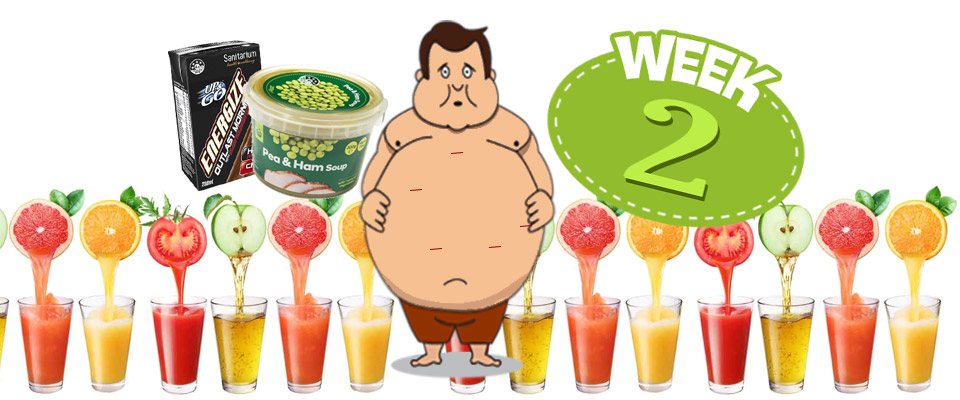
by Me | Oct 4, 2018 | Food & Diet, Post-Surgery
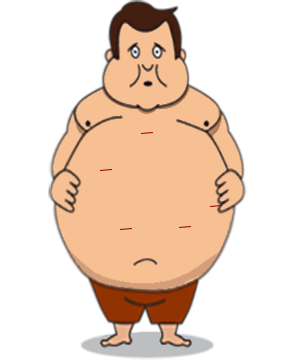 2 weeks know since my surgery and I am feeling GREAT !!!
2 weeks know since my surgery and I am feeling GREAT !!!
I have lost 8Kg since surgery and people have started to notice and comment…. Some have said that I am “looking a lot younger”… and I have even been called “boyish” !!!
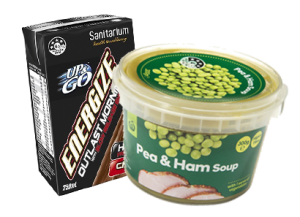 I have survived my 2 week liquid diet…. It was actually a lot easier than I had anticipated…. I was not at any stage hungry – and had to actually remind myself to “eat” and drink.
I have survived my 2 week liquid diet…. It was actually a lot easier than I had anticipated…. I was not at any stage hungry – and had to actually remind myself to “eat” and drink.
I mostly ended up “eating” Up and Go (various flavours), Woolies Fresh Soups (Pea & Ham was my favourite), and Protein Water…. although towards the end I must admit I did sneak a few Jatz biscuits and BBQ Shapes (which I made sure that I chewed to a paste before swallowing).
I also had some fruit juices and blitzed up some fruit smoothies which made a nice change.
On just one occassion I think I ate too much and started to feel a bit uncomfortable… not even close to throwing up… but I did have some intestinal pain and diarrhoea…. I’m guessing this may be a little of what I need to watch out for when I start eating solids.
Now I get to start on “mush” – which actually isn’t quite as bad as it sounds, because I can have things like Scrambled or Poached eggs, and even mince (with lots of sauce)… I will do a more detailed post soon on what I get to eat for the next 2 weeks 🙂

by Me | Sep 26, 2018 | Food & Diet, Post-Surgery
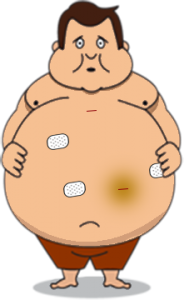 Day 6 and everything still doing remarkably well…. Still no pain… Feeling completely normal (except I am not hungry)… Not struggling at all with the liquid diet… and no Diabetes medication since the day of surgery and my Blood Sugar Rocks !!!
Day 6 and everything still doing remarkably well…. Still no pain… Feeling completely normal (except I am not hungry)… Not struggling at all with the liquid diet… and no Diabetes medication since the day of surgery and my Blood Sugar Rocks !!!
I have been doing daily weigh-ins – and have lost 6Kg since the surgery 🙂
Another of my dressing came off in the shower this morning…. the incision is even smaller than the first one…. and I can probably take off the remaining dressings, but figured I would leave them for another day or so. The original incision (dressing came off day 2) is a little red, and has a little yellow bruising around it…. but appears to be healing very nicely.
Dietitian Consultation
I had the first follow up session with the Dietitian today (was a week early because she is away next week)…. Everything good… I get to stay on my liquid diet (lucky me) but can switch to mush pureed foods next Thursday (14 days after op).
2nd dietitian consult (and first follow up with the surgeon) scheduled for 3 weeks time. These follow up sessions cost no extra because it is included in the original surgery fee.

by Me | Sep 17, 2018 | Food & Diet, Post-Surgery
Just a few more days now until my Surgery… time now to start thinking about (and planning for) what I will need to “eat (and I do use the term loosely) when I get out of hospital.
The aim for the first month or so post-surgery is wound repair and recovery and the focus of diet is protein and fluid.
Liquid Diet
A fully liquid diet will allow for healing without placing stress on my newly formed stomach…. I will need to stay on fluids for 2-3 weeks following surgery. The consistency of the fluids I can drink should be about the consistency of milk.
Hydration and Protein
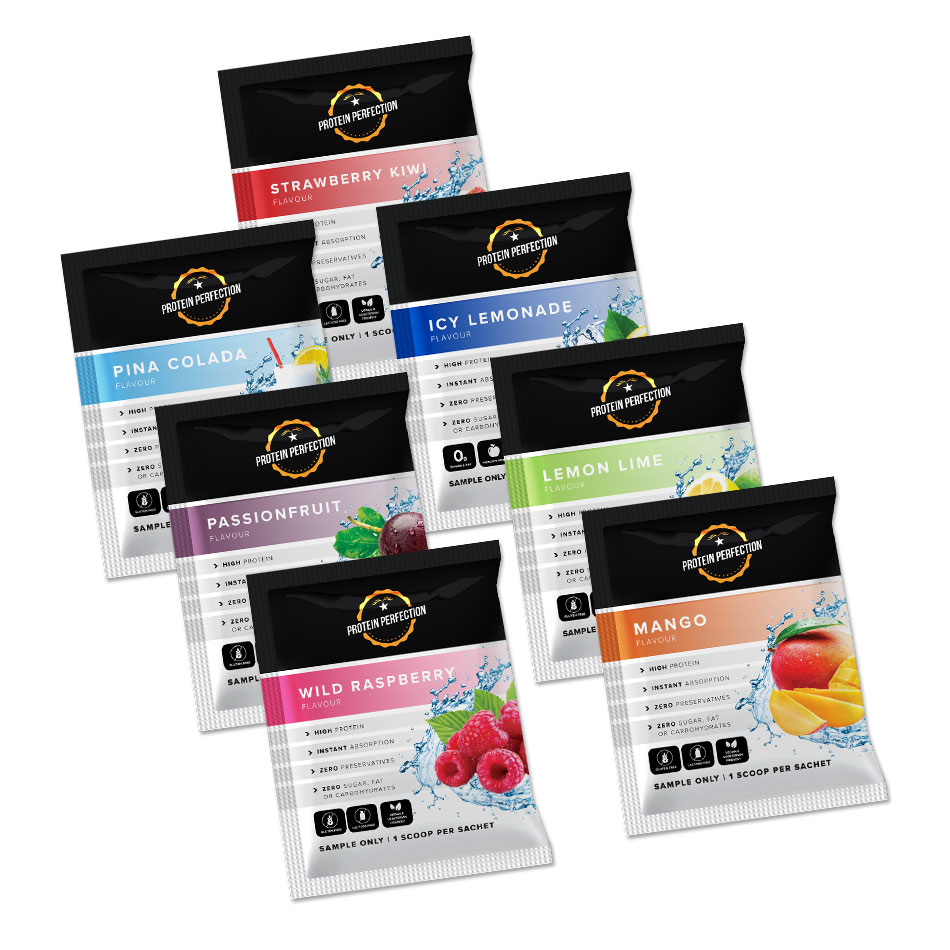 I will need to focus on keeping up hydration and obtaining enough protein to help with wound repair and recovery. For the first few days I will only be able to tolerate small amounts (20-30ml) at a time although this will gradually increase as I start to heal. After 2 weeks I may be able to slowly drink a whole cup (250ml) at a time (oh Joy:))
I will need to focus on keeping up hydration and obtaining enough protein to help with wound repair and recovery. For the first few days I will only be able to tolerate small amounts (20-30ml) at a time although this will gradually increase as I start to heal. After 2 weeks I may be able to slowly drink a whole cup (250ml) at a time (oh Joy:))

I will need to take a high protein drink (60-80g of protein) each day as well as a soluble multivitaim supplement.
I can contuinue to have OptiFast Shakes and Soups, for “meals” and have been recommended to try Protein Perfection Protein Water (who knew suxh a thing existed ???) and also take 2 x BN Multi Chewable Multivatimins each day.
Allowed & Not Allowed
Here are some examples of the types of liquids I can and can’t have :
Allowed
|
NOT Allowed
|
| Skim milk, soy milk, lactose free milk |
Porridge, Semolina, Weetbix |
Fruit Smoothies (strained), Fruit Juice,
Vegatable Juice (such as V8) |
Thickshakes, ice cream, custard, jelly |
| Up and Go, Sustagen |
Cheese, Cream Cheese |
| Optifast Shakes & Soups, Protein water |
|
| Thin smooth soups (e.g. pumpkin soup) |
Thock soups (thicker than milk) |
| Hydralyte, Powerade Zero, Diet Cordial |
Soft drinks |
| Tea, Coffee, Herbal Tyea, instant soup (strained) |
|
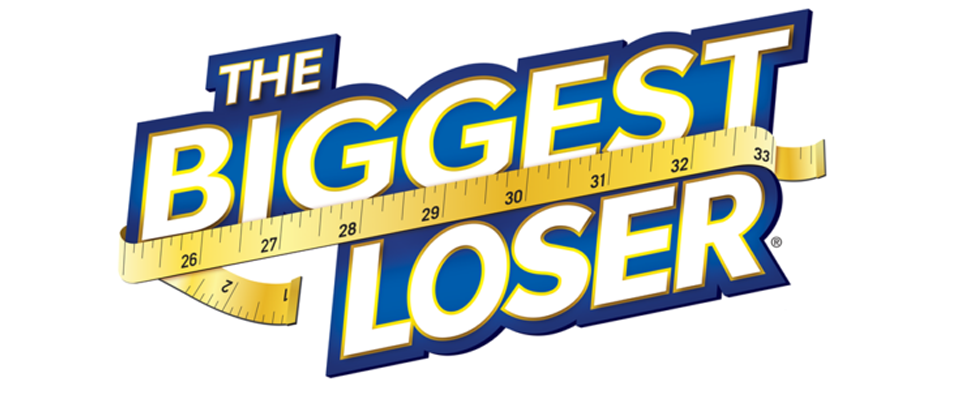
by Me | Sep 16, 2018 | Food & Diet, Weight Loss Surgery Research
I’ve been doing a lot of research into the effectiveness of Weight Loss Surgery – and in particular, the long term benefits it has to offer. All the data I have encountered (Swedish Obesity Study, US Veterans Study) highlights the significant advantages of weight loss surgery over traditional weight loss strategies (diet, exercise, counselling, support). It is largely this data which convinced me that the risk of not doing anything was much higher than the risk of the surgical option.
But I started to wonder what type of research there was about the long term effects of non-surgical weight loss strategies.
The Biggest Loser
 The Biggest Loser was (once) a very popular reality TV program which followed the progress of severely obese contestants to see who could lose the most weight (for a significant prize). It started out in the USA in 2004 and ran for 17 seasons over a 12 year period. The show came to Australia in 2006 and ran for 11 seasons to 2017.
The Biggest Loser was (once) a very popular reality TV program which followed the progress of severely obese contestants to see who could lose the most weight (for a significant prize). It started out in the USA in 2004 and ran for 17 seasons over a 12 year period. The show came to Australia in 2006 and ran for 11 seasons to 2017.
This program provides a very public glimpse into spectacular weight loss results achieved in a relatively short period, by very motivated people with lots of support, assistance and motivation. It demonstrates that massive weight loss can certainly be achieved in the short term, but offers no indication as to the long term benefits of this type of weight loss regime… In fact when you look into it a little deeper any information about long term results is noticeable by its absence. Apart form a few “guest appearences” from past contestants (usually from the previous season), there is next to no mention of how the rest are getting on.
In 2016, a study published in Obesity Journal examined the current situation of 14 contestants, 6 years after they appeared as contestants on The Biggest Loser. The focus of this study was primarily to look at long term changes in their metabolic rate.
Researchers studied 14 contestants who participated in the 30-week competition, which involves intensive diet and exercise training. They started at an average weight of 149 kg and ended at an average weight of 91 kg. Six years later, when the six men and eight women went to the National Institutes of Health for follow-up measurements :
- weight, on average, was back up to 131 kg. Only one participant hadn’t regained any weight.
- percent body fat started at an average of 49 percent, dipped to 28 percent and returned to 45 percent over time.
All but one subject regained some of the weight lost during the competition and five subjects were within 1% of their original weight or above. On average, the group regained much of their weight but did maintain about 12 percent weight loss even after six years, had better cholesterol profiles, and none had developed diabetes during follow-up.
Summary
While most subjects experienced substantial weight regain in the 6 years since “The Biggest Loser” competition, the mean weight loss was 11.9% compared with their original baseline weight and 57% of the participants maintained at least 10% weight loss. In comparison :
- 20% of overweight individuals maintain at least 10% weight loss after 1 year of a weight loss program (Wing RR, Phelan S. Long-term weight loss maintenance. Am J Clin Nutr 2005;82:222S-225S.).
- 37% of the lifestyle intervention arm of the Diabetes Prevention Program maintained at least 7% weight loss after 3 years (Wing RR, Hamman RF, Bray GA, et al. Achieving weight and activity goals among diabetes prevention program lifestyle participants. Obes Res 2004;12:1426-1434.),
- 27% of the intensive lifestyle intervention arm of the Look AHEAD trial maintained 10% weight loss after 8 years (Look ARG. Eight-year weight losses with an intensive lifestyle intervention: the look AHEAD study. Obesity (Silver Spring) 2014;22:5-13.).
Conclusion
The 2016 study found that only one of the 14 Biggest Loser contestants examined weighed less than when the competition completed, with four of them now heavier than their starting weight, and nine returning to within 10% of their previous weights. Whereas according to the Journal of Obesity outcomes for patients undergoing gastric bypass surgery are far superior, with patients losing 60-70 per cent of excess weight after a year with approximately 50 per cent of this access weight loss maintained after 15 years.


 I did manage three quarters of it before I started to feel full and a little uncomfortable (which is not unusual), so I stopped. However, this time, after about 5 minutes I suddenly (without any warning) felt the need to throw up.
I did manage three quarters of it before I started to feel full and a little uncomfortable (which is not unusual), so I stopped. However, this time, after about 5 minutes I suddenly (without any warning) felt the need to throw up. p.s. although I was tempted… I didn’t go back later and finish off he sausage roll 🙂
p.s. although I was tempted… I didn’t go back later and finish off he sausage roll 🙂

 I am satisfied that there was no direct link with my Blood Sugar readings and consumption of diet soda (I used to have 2 and up to 6 cans of Pepsi Max a day)… These drinks are “sugar free” and I could see that my blood sugar was unaffected 1-3 hrs after consumption (whereas I could see spikes in blood sugar after eating carbs/sugary food)… However research by the Adelaide Medical School has found that high intake of low-calorie sweeteners (like those found in diet drinks) over just two weeks was enough to significantly alter the make-up of bacteria in the gut… which in turn effects the way the body absorbs and regulates blood sugar – increasing the risk of developing diabetes over time.
I am satisfied that there was no direct link with my Blood Sugar readings and consumption of diet soda (I used to have 2 and up to 6 cans of Pepsi Max a day)… These drinks are “sugar free” and I could see that my blood sugar was unaffected 1-3 hrs after consumption (whereas I could see spikes in blood sugar after eating carbs/sugary food)… However research by the Adelaide Medical School has found that high intake of low-calorie sweeteners (like those found in diet drinks) over just two weeks was enough to significantly alter the make-up of bacteria in the gut… which in turn effects the way the body absorbs and regulates blood sugar – increasing the risk of developing diabetes over time.
 2 weeks know since my surgery and I am feeling GREAT !!!
2 weeks know since my surgery and I am feeling GREAT !!! I have survived my 2 week liquid diet…. It was actually a lot easier than I had anticipated…. I was not at any stage hungry – and had to actually remind myself to “eat” and drink.
I have survived my 2 week liquid diet…. It was actually a lot easier than I had anticipated…. I was not at any stage hungry – and had to actually remind myself to “eat” and drink.


 I will need to focus on keeping up hydration and obtaining enough protein to help with wound repair and recovery. For the first few days I will only be able to tolerate small amounts (20-30ml) at a time although this will gradually increase as I start to heal. After 2 weeks I may be able to slowly drink a whole cup (250ml) at a time (oh Joy:))
I will need to focus on keeping up hydration and obtaining enough protein to help with wound repair and recovery. For the first few days I will only be able to tolerate small amounts (20-30ml) at a time although this will gradually increase as I start to heal. After 2 weeks I may be able to slowly drink a whole cup (250ml) at a time (oh Joy:))

 The Biggest Loser was (once) a very popular reality TV program which followed the progress of severely obese contestants to see who could lose the most weight (for a significant prize). It started out in the USA in 2004 and ran for 17 seasons over a 12 year period. The show came to Australia in 2006 and ran for 11 seasons to 2017.
The Biggest Loser was (once) a very popular reality TV program which followed the progress of severely obese contestants to see who could lose the most weight (for a significant prize). It started out in the USA in 2004 and ran for 17 seasons over a 12 year period. The show came to Australia in 2006 and ran for 11 seasons to 2017.